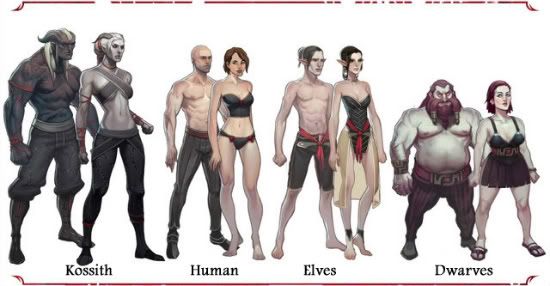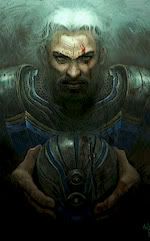Post by The Maker on Sept 16, 2011 11:41:14 GMT -5

Kossith
Taller and physically more robust than humans, the Kossith race is distinguished by their strength, their gray hued skin and their horns (even some are born without). They have white hair, slightly pointed ears, and vivid eyes with colors like violent, red, or yellow. They primarily inhabit the island nations of Par Vollen, Seheron in northern Thedas, as well as the settlement of Kont-Aar in northern Rivain. The Kossith are divided between the two factions known as the Qunari and the Tal-Vashoth, by those who follow the Qun and by those who do not.
Qunari
The primary symbol used to represent the Qunari as a people is a triangle, which symbolizes the Qunari triumvirate of body, mind, and soul. The "body" is represented by the Arishok (the military), the "mind" by the Arigena (the craftsmen), and the "soul" by the Ariqun (the priests). It is this triumvirate which governs all of Qunari society by acting as the three pillars or their three primary leaders in all matters—the Arishok (always male) who leads the armies, the Arigena (always female) who leads the craftsmen, and the Ariqun (either male or female) who leads the priesthood. All three are the head of their respective "paths" and work in unison to complete the whole of Qunari society.
Duty is paramount in Qunari culture, and their society is seen as a living entity, whose wellbeing is the responsibility of all. Each person is like a drop of blood in the veins of the being, and they must do not what is best for them, but what is best for the creature.
The Qunari army is the eyes, ears, legs, arms, and hands of the creature, everything that one needs to interact with the world, and so most Qunari encountered by Theodesians belong to the military. One cannot understand somebody by simply studying their hand or foot, and so to truly comprehend Qunari society, one must visit their cities where the heart and soul dwell.
Qunari society is based upon learning as well as military might. Few speak the common tongue that is used among Theodesians, and even fewer speak it well. For this reason, Qunari often keep quiet among foreigners, out of shame—in a culture that strives for perfection and mastery, to possess only a passable degree of skill is humiliating, indeed.
A Qunari's personal name is not what we think of as a name. It is more like a social security number, information which the Tamassrans use to keep track of breeding, and is thus not something a Qunari uses to refer to one another. What a Qunari instead thinks of as their name is, in fact, their job title, which is differentiated by rank and task.
Qunari have no "family units": they do not marry, choose partners, or even know to whom they are related. A Qunari's "family" consists of his or her coworkers.
Qunari generally do not associate mating with love. They feel love. They have friends. They form emotional bonds with one another. However, they simply do not sleep with each other to express it. If they do, then they are sent to be reeducated by the Ben-Hassrath. If a child is produced, the same thing happens as with all other Qunari children: it is sent to be raised by the Tamassrans, evaluated, and assigned a job. Qunari do not waste resources unnecessarily, people included.
The Tamassrans wield a great deal of influence in Qunari society. As it is primarily a female gender role (as all administrative tasks are), this might lead an outsider to believe that their society is female-dominated. Qunari do not, however, look upon government in quite the same way. The brain could be said to rule the body, but so too does the heart, the lungs, the stomach. All are part of the greater whole.
The Tamassrans raise all the children, give them their general education, and evaluate them. Qunari are officially assigned their roles at twelve years of age. The Tamassrans do conduct some tests, however nothing requiring a pencil. They also have something of a head start on the process, as they are the ones who control the Qunari selective breeding program.
Roles among the Qunari
Qunari believe that the genders are inherently better at certain tasks. No matter how much aptitude a male shows for management, he will never be quite as good at it as a female, therefore it would be considered inefficient to place him in a role where a woman might serve better. Instead, the Tamassrans find another role that he shows aptitude for and place him there instead.
Qunari have been bred for specific roles for a very long time. Parentage is no longer the issue, more like pedigree. However, breeding does not determine a Qunari's assigned task. If a Qunari was bred to be a soldier but turns out to be more intellectual, the Tamassrans may move him into the priesthood, researching weapons technology, or the Ben-Hassrath, policing the populace, depending on what roles need to be filled by someone with their specific traits.
All Qunari are given a tool which signifies their role in Qunari society; for soldiers, this tool is always a weapon on some kind. In the case of soldiers, at least, to lose this weapon brands the owner as soulless and one who is to be be executed on sight by the Antaam. These items are held in high regard, and upon the owner's death the Qunari may take the item to honor the fallen individual. A corpse is considered an insignificant husk that is no longer the individual that it once was and thus is afforded no special treatment, rather disposed of whatever manner is most practical.
Qunari have their own mages. These saarebas (literally "dangerous thing", from the root word bas, thing/object) are considered defective tools, but the Qunari do not waste those, either. These Qunari mages are kept literally on leashes, held by an arvaarad ("one who holds back evil", i.e. their "handler"). Should they ever be seen performing forbidden magic, the mage's tongue is immediately cut out in order to prevent them from communicating and possibly corrupting someone else.
Economy
Qunari do not have currency. "Merchants" in Qunari cities have the job of making sure that goods are distributed appropriately. Qunari do not buy and sell things amongst one another.
Technology
The Qunari have developed certain technologies absent in Thedas, such as "gaatlok" (gunpowder) and cannons, the secrets of which they continue to carefully guard. With these technologies the Qunari were able to sweep across much of Thedas, including parts of the Tevinter Imperium. It wasn't until Thedosian nations began using magi against them in large numbers that the Qunari were pushed back, magical attacks proving to be a counter for their cannons.
Tal-Vashoth
The Tal-Vashoth are former Qunari who have rejected what the Qun, the Qunari way of life, teaches and move to fight agaisnt it. Just as Qunari denotes those that follow the Qun, elves and humans included, Vashoth denotes those who no longer wish to adhere to its rules; it is not specific to race. Literally, Vashoth means "Grey" and Tal-Vashoth means "True Grey". Often times they will become mercenaries in other lands. It is not uncommon for a Tal-Vashoth to remove their horns as a form of protest agaisnt the Qun (as in the case of Armaas, and perhaps most mercenaries).
It is not entirely clear what motivates Qunari to reject the Qun, but one of the most likely reasons is the assignment of a very low and unpleasant place in Qunari society. Qunari who have ambition above their station, such as Armaas, or those bound by the Qun, come to resent their place in society, and thus the Qun. Others, such as Maraas, seem to simply tire of a life driven by duty and purpose. By leaving the Qun, people are named Vashoth by other Qunari. Those who come to hate their old society so much that they relish the outcast role the Qunari place upon them, sawing off their horns and terrorizing the Qunari countryside are called Tal-Vashoth or "True Grey".


